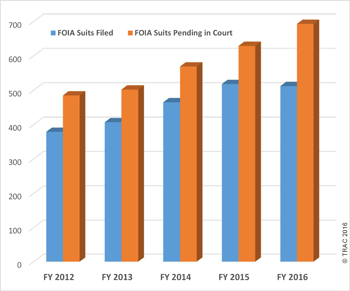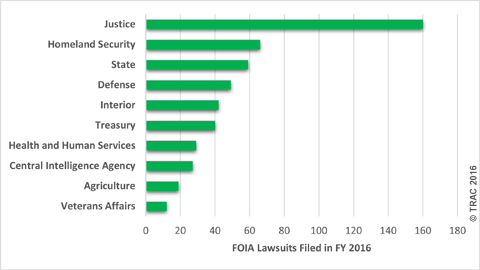FOIA Lawsuits Mirror News Headlines in FY 2016
Court records show that a near record number of 512 federal Freedom of Information Act (FOIA) lawsuits were filed against government agencies during FY 2016. In addition, the backlog of FOIA suits waiting to be decided rose to its highest recorded level with 693 cases pending before the federal district courts at the end of the fiscal year.
The number of FOIA lawsuits filed year-by-year has increased 35 percent over the past five years, while the cases unresolved in the federal courts rose 43 percent over this same FY 2012- FY 2016 period. See Figure 1.
 Figure 1. FOIA Litigation Up Sharply Over Last Five Years
Figure 1. FOIA Litigation Up Sharply Over Last Five YearsThis steady rise in FOIA lawsuits challenging disclosure practices of the Obama Administration has brought the eight-year total to 3,416 such suits that have been filed during his presidency. Although complete information about the various possible causes for this surge in FOIA filings is not available in the court records, it occurred despite promises of greater openness from President Obama and his attorney general when they came into office.
However, the records do show that during this period FOIA lawsuits have climbed 28 percent over the number filed during the previous Bush Administration. During the Bush’s eight years in office FOIA lawsuits totaled 2,660.
While many factors may have contributed to this rise, including changes in the law and a growing willingness to challenge FOIA practices in court on the part of public interest and advocacy groups, the numbers alone highlight the important role FOIA played in helping ensure a vibrant democracy.
Updated and Expanded FOIA Lawsuit App Released
Accompanying this report, FOIAproject.org has just updated and expanded* the project’s FOIA Lawsuit App. This free user tool allows the public to drill into these numbers to track FOIA litigation trends over time.
Available are trends not only on new suits filed, but also on how long suits have taken to complete. The backlog of FOIA cases currently pending before federal district courts is also detailed, along with how long cases have been waiting resolution.
Users can examine overall figures, or drill in by government department, by agencies within departments, and by independent agencies.
Lawsuits Often Mirrored, Sometimes Drove News Headlines
A catalog of FOIA lawsuits filed during FY 2016 frequently reads very much like the news headlines from the past year. This underlines the important role FOIA did play in fueling public discussions. Reporters and news organizations sought records about government policies and practices to probe further behind the headlines, and to create new headlines of their own. FOIA suits filed by public interest groups, representing viewpoints all along the political spectrum, sought records to examine government practices they wished to change, to try to uncover possible wrong doing, and to support their various policy agendas.
With 512 suits filed last year, the following examples are only illustrative. Full information describing each lawsuit that was filed is available through FOIAproject.org’s weekly blog posts covering each newly filed FOIA case.
Use of Private Email Accounts. One topic that underlines the role of FOIA in public debate last year was the number of suits filed for records about the use by top government officials of private email accounts. Much of the spike in suits filed against the State Department, for example, centered around this issue.
The Republican National Committee got in the act filing a series of suits. Among them was a suit for records concerning any emails sent to State Department officials from emails addresses associated with the Clinton campaign. They also sought records on the training of State Department officials on handling and securing classified information, and visitor logs. Among the suits filed by the news media included one by New York Times reporter Eric Lipton concerning emails sent to or from senior State Department officials and five specific non-governmental email addresses, and another lawsuit filed by The Daily Caller News Foundation concerned security and information technology training for senior agency officials.
But the net for uncovering the extent of use of private email accounts extended beyond the State Department. For example, Judicial Watch sought records sent or received by Secretary of Homeland Security Jeh Johnson and several other high-ranking officials using non-government email addresses. It filed another action for records indicating whether high-ranking Justice Department officials used alias email addresses. The New York Times sued for emails exchanged between Secretary of Defense Ash Carter and several high-ranking DOD officials sent from Carter’s personal email account.
Ensuring National Security. National security and terrorism also were a focus of FOIA litigation last year. One suit, for example, was filed jointly by the Associated Press, USA Today and VICE News for FBI records concerning the purchase of a device that allowed it to break into iPhones in relation to its investigation of the San Bernardino shooting. The Electronic Frontier Foundation sued for requests to the Foreign Intelligence Surveillance Court to order Apple or any other communication company to provide technical assistance.
There was also a suit by Chelsea Manning who was convicted of illegally disclosing classified information to WikiLeaks, and was seeking records concerning the FBI’s investigation in her case. While the James Madison Project brought suit for records concerning Thomas Drake, a former NSA employee who was accused of espionage.
Journalist Jason Leopold and researcher Ryan Shapiro sued the CIA for records referenced in the public portions of the Senate Intelligence Committee’s report on the use of torture. New York Times reporter Charlie Savage sued the Office of the Director of National Intelligence and the Department of Justice for records concerning threat assessments of Guantanamo Bay detainees produced by a six-agency task force. While the State of Kansas sued the Department of Defense for records on the transfer of Guantanamo detainees to the U.S. mainland.
On a quite different topic, although related to our country’s overall defense effort, was a lawsuit filed by the National Veterans Legal Services Program against the Department of Veterans Affairs for records concerning the treatment of female veterans.
Immigration. Immigration and refugee matters, also frequently in the news last year, generated a fair number of FOIA suits. For example, Homeland Security was the subject of suits brought by the Federation for American Immigration Reform for communications between U.S. Citizenship and Immigration Services and the White House concerning resettlement of Syrian refugees. The National Day Laborer Organizing Network (and others) sued for records concerning Immigration and Custom Enforcement’s Priority Enforcement Program designed to deport noncitizens committing serious crimes and recent border crossers.
The Federation for American Immigration Reform sued for State Department records on the number of applicants for asylum from Central American countries. And on a quite different matter, employees of the Russian airline Aeroflot filed suit for records concerning U.S. Custom and Border Protection’s seizure of their assets.
Environment and Wildlife Protection. Environmental matters were also the subject of a number of suits. These included one filed by the Environmental Defense Center for Interior Department records concerning oversight of a pipeline which had experienced a recent spill. The Taylor Energy Company LLC filed suit seeking records that formed the basis for online materials the Interior Department had posted about their Taylor Energy oil discharge. Freedom Watch sued the Bureau of Labor Management and the Department of Justice for records concerning the confrontation with rancher Cliven Bundy in Nevada.
Another lawsuit was filed by the Center for Environmental Science, Accuracy & Reliability for U.S. Fish and Wildlife Service records concerning a permit issued for the construction and operation of the Emergency Delta Barriers in California. Three Oregon-based organizations filed suit for records of the U.S. Bureau of Reclamation and the U.S. Fish and Wildlife Service concerning the delivery of water to Tule Lake National Wildlife Refuge.
The New England Anti-Vivisection Society sought records related to a permit under the Endangered Species Act to export eight chimpanzees. The Humane Society International sued about records concerning the import and export of all wildlife specimens from the U.S.
Donald Trump. Finally, even then candidate Donald Trump was the focus of some FOIA litigation last year. Journalist Jason Leopold and researcher Ryan Shapiro filed suit for Internal Revenue Service records concerning Donald Trump’s tax audit. While the Partnership for Civil Justice Fund sued for records concerning restricting the use of public forum space abutting the Old Post Office Building in Washington, D.C. in favor of use for private gain by the Trump Organization and its Trump International Hotel.
Justice, Homeland Security and the State Department Subject of the Most Suits
In terms of sheer numbers, as shown in Figure 2, the most frequent defendant in FOIA lawsuits last year was the Department of Justice. It was sued 160 times – an all-time record for that agency. The FBI and the Executive Office for United States Attorneys were the units within Justice that were most frequently named.
 Figure 2. Top Ten Agencies That Were Most Frequently Sued Under FOIA During FY 2016
Figure 2. Top Ten Agencies That Were Most Frequently Sued Under FOIA During FY 2016The Department of Homeland Security had the second highest number of FOIA lawsuits challenging its FOIA practices. These 66 lawsuits again were a record number for that agency. The U.S. Citizenship and Immigration Service followed by Immigration and Customs Enforcement (ICE) were the most frequent subjects of these lawsuits.
The State Department had the third highest number of FOIA lawsuits in FY 2016. While a much smaller agency than either Justice or Homeland Security, it was sued 59 times – double the number of suits filed against it just two years ago. Controversy over former Secretary Clinton’s use of a private email server, as discussed above, fueled a significant segment of this litigation.
Forty-nine suits were filed against the Department of Defense, the lowest level since FY 2013, placing it in fourth place in terms of FOIA litigation it had to answer to. The handling of FOIA requests by the Army and the Air Force were the most often cited in this litigation, followed by the National Security Agency.
In contrast to Defense which saw suits against them decline, the Department of Interior – with the fifth most suits filed against it – saw its lawsuits spike. Their lawsuits jumped from just 22 the previous year, to 42 during FY 2016. The Bureau of Land Management and the Fish and Wildlife Service were the most frequent units within Interior named in the complaint.

In reading the partial list of names who’ve increasingly filed suits, 80%-90% of them are right-wing witch hunters that look for anything that can be taken out of context and then used to distract discourse from the real issues… I hope someone dives deep into the data and provides, among other things to explain the increases, the political leanings of the groups like the anti-immigration group FAIR. Some, actually, a lot of these groups are funded by the Koch brothers and they are funded to make false accusations, waste millions of dollars in endless committee hearings and fodder for right-wing media to endlessly create fear, doubt and anger Then they use the chaos as reason to support their quest to dismantle our govt. For our democracy’s sake, we need to expose, shame and thwart FOIA abuse…how though? The abusers are primarily well-funded metastasizing right-wing-taxpayer-money wasting front groups.